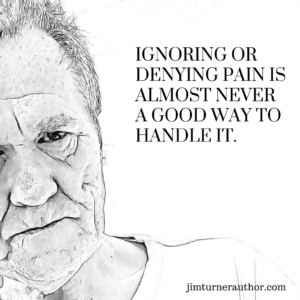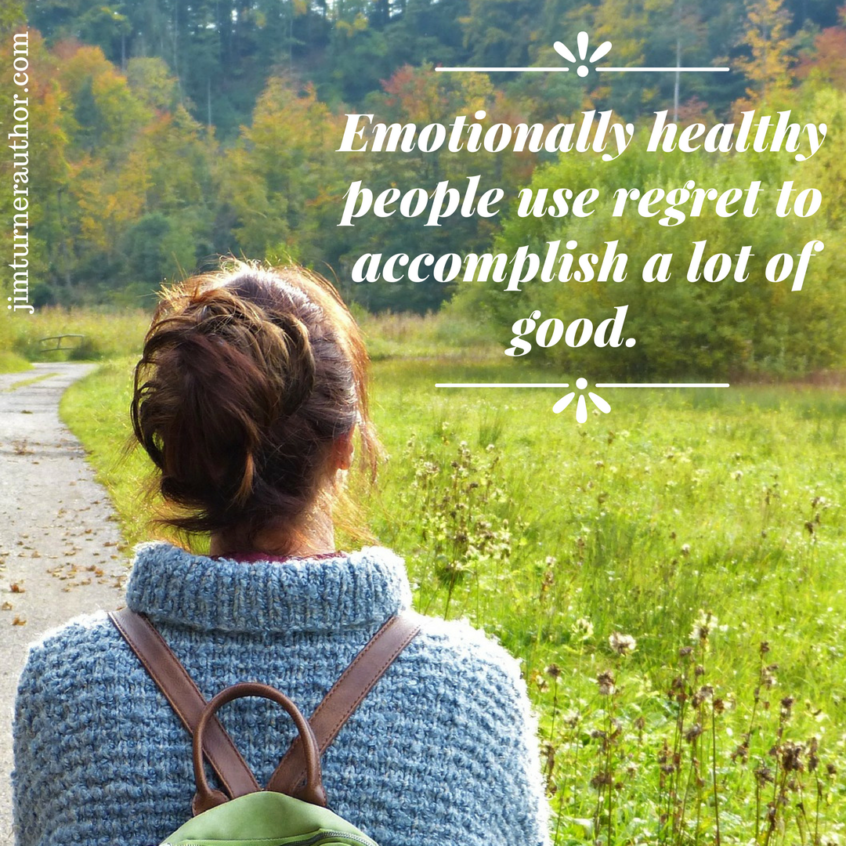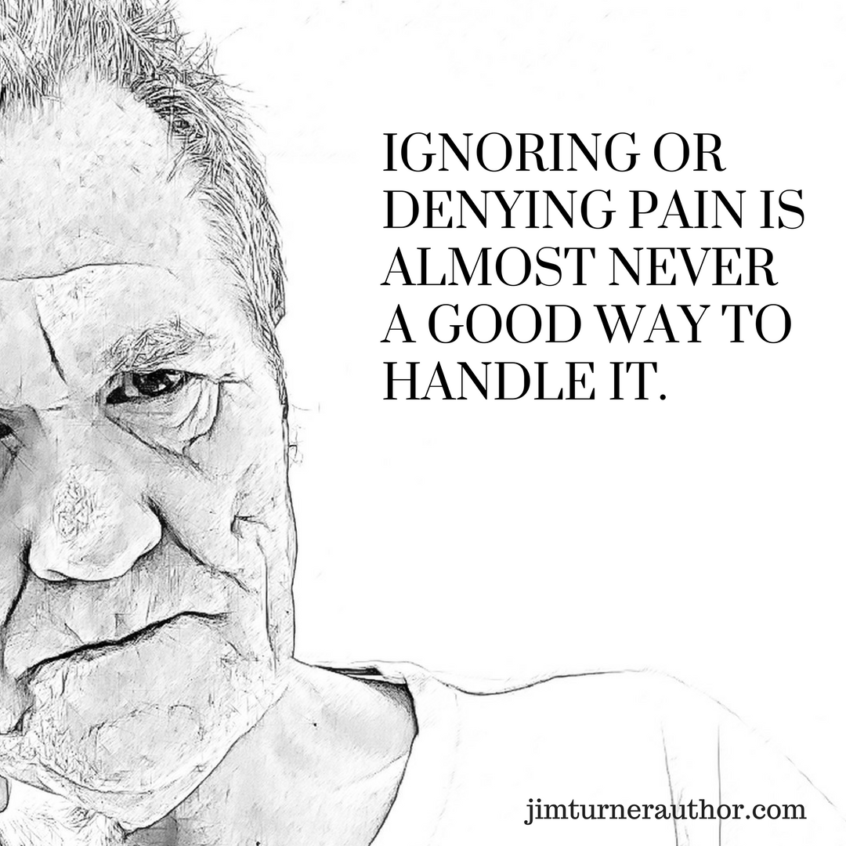Regrets – have any?
I think the only folks who don’t might be practiced sociopaths. Most everyone else does, and we do different things with them. Some allow regret to run their lives, they give in to the brutal taskmaster. Some do little dances with regrets from time to time and never dismiss them as potential dance partners. Some use their regrets as weapons against others, blaming them for missed opportunities or breaks in relationships. And some emotionally healthy people use regret to accomplish a lot of good.

Here’s an interesting aside. Disconnected men don’t let many regrets affect them. Healthy people often suspect them to be slightly, or entirely, sociopathic. They’re not. At least not typically. Disconnected men aren’t sociopaths, they are men who don’t access their feelings. They have them, but they are unconsciously locked away so they don’t feel the pain of them. The feelings are buried deep enough that they don’t often surface. When they do, gusher! And those gushes of emotions are very uncomfortable, so disconnected men do their best to avoid them. This includes regrets. But on with our discussion.
I am, of course, talking about relationship regrets. You may have some stock market, or real estate, or job, or vacation destination choice regrets – but those are temporary. I’m talking about matters of the heart. Things that last because they include other souls. Souls that were connected in some way. Those regrets have a tendency to sting more and last longer.
[clickToTweet tweet=”Emotionally healthy people use regret to accomplish a lot of good” quote=”Emotionally healthy people use regret to accomplish a lot of good”]
By the way, I realize that there are some financial and other regrets that have had a powerful effect on lives. Some could have become rich had they just invested that $5000 they had when Apple stock was under $50. Some could have already retired if they had just stuck with that job. I call these temporary because they are short lived obstacles to happiness. Study after study has been published to show that happiness and overall health is due more to our relationships than to any financial or ease-of-life gain we could have enjoyed.
Knowing the power of relationships, it makes sense to talk about our relational regrets and how to overcome them. As with many of the other topics this blog covers, it would take a book to list all the sources of relational regret. If we tried, we would most likely miss many of them. Let me instead invite you to think about your story as I share a little of mine.
As a disconnected man, I was much like my description in the aside above. I never gave more than a moments thought to regret. I had no time for it. I was busy working or being productive in some way. The emotions attached to regret were not pleasant for me. I made sure not to let memories linger that would bring regrets to the fore. That was not a healthy way to handle regrets. Ignoring or denying pain is almost never a good way to handle it.
[clickToTweet tweet=”Ignoring or denying pain is almost never a good way to handle it.” quote=”Ignoring or denying pain is almost never a good way to handle it.”]And that’s what we are talking about, isn’t it? Pain. Sorrow. Loss. The emotions associated with regret. None of which were welcome on my doorstep. Until God changed all that. I won’t go into the full story here. If you want to hear more of how God turned me inside-out you’ll find it in my book the disconnected man: breaking down walls and restoring intimacy with him. (Which, exciting news, I just received the first two hardback copies of today. You can get yours by visiting the Order tab on this website.)
For now, here’s a passage from the book that will give you some insight.
“Having coffee with a friend is not supposed to turn into a personal crisis, but it did for me.
I don’t remember what the weather was like outside the cafe that day, but I remember the weather change in my heart. My friend Matt was completely unaware that our conversation and his candid observation would be the rocks that the fragile ship of my heart was about to break upon…
Matt said, ‘Jim, I have something I want to say to you – something I don’t think you will like…’ He continued, ‘Do you realize that you don’t care about me at all? I do not matter to you one bit…when I walk out that door, you wouldn’t care at all if we never spoke again. You’d carry on without another thought about me. And the real problem is that you think this is normal…’
I did think it was normal. And nothing could have ever been more wrong. More from the book,
‘I spent the next few days after my talk with Matt in a profound haze. I was disoriented, wandering through the pathways of my mind, searching for lost pieces of the puzzle of my life. I keep asking over and over, What is wrong with me?…How can a simple question lead to such inner pain? Why do I suddenly feel so lonely?’
I suddenly and violently felt regret. And it was devastating. Every relationship that I had ever walked away from, failed to nurture, or give importance to came roaring back into my consciousness with the heat of a thousand fires. I was emotionally drowning in regret while the pain burned inside me. It was a horrible time.
By the grace of God, I endured. With God’s sustaining power, I held on. With God’s love, I made it through the pain and started learning how to handle regret. Without diving into all the details, I will simply say that I think I learned how healthy people handle regret. I don’t think it takes a lot of steps like some things do. With that in mind, let me summarize what I think is the best mindset to have in order to work through regret. Here it is.
 Feel the pain, let it burn deep. (this is especially true for disconnected men – feeling the pain is a must) Then let the shadow of that pain dwell in a place that you don’t forget while you move past it. In other words, remember it enough to learn from it, but don’t let it take control. Refuse to allow it space in your mind except as a temporary reminder. Make no decisions based on the pain of regret, but let that pain be one of the many counselors you consult as needed.
Feel the pain, let it burn deep. (this is especially true for disconnected men – feeling the pain is a must) Then let the shadow of that pain dwell in a place that you don’t forget while you move past it. In other words, remember it enough to learn from it, but don’t let it take control. Refuse to allow it space in your mind except as a temporary reminder. Make no decisions based on the pain of regret, but let that pain be one of the many counselors you consult as needed.
Using regret to inform us will allow us to remain emotionally healthy without denying the pain.
This goes hand in hand with what Paul said about things in the past in his letter to the Philippians, chapter 3, verses 13-14.
Brothers, I do not consider myself to have taken hold of it. But one thing I do: Forgetting what is behind and reaching forward to what is ahead, I pursue as my goal the prize promised by God’s heavenly call in Christ Jesus.
Paul wasn’t any different than us when it comes to remembering. He could remember what happened to him the same as us. What he was getting at was that he made a conscious choice to not let his past affect his future. No regrets where going to sidetrack him from the calling God had placed upon his life. That call is the same for us. To know and to become like Jesus.
One very important note here. Relationships are one of the key things God uses to help us know what He is like and to refine us into the image of His Son. Giving into regret will stall your progress to becoming like Jesus. Paul would have nothing to do with them. He left them behind in order to pursue the ultimate goal. Getting stuck in regret will prevent you pursuing the goal! Be an active forgetter and a determined pursuer – you will find that regret will be without regrets when you do.


